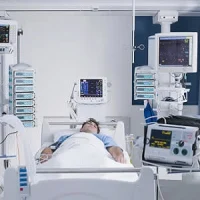A randomised controlled trial demonstrates that music intervention to prevent delirium among older patients is one of few strategies that provide support in a critical care setting. This study builds on non-pharmacologic approaches for delirium prevention by addressing the pathophysiologic mechanisms that contribute to delirium; neurotransmitter imbalance, inflammation, and acute physiological stressors.
Delirium is a neurobehavioural syndrome characterised by alterations in consciousness, attention, cognition and perception. Clinical manifestations of delirium include hyperactive (i.e., agitation, restlessness), hypoactive (i.e., apathy, lethargy) and mixed delirium (combination of the first two types). The highest rate of delirium occurs in hospitalised older adults. With normal age related changes there is a low grade inflammation with chronic neurodegenerative changes in brain, as well as lower physiologic reserve to maintain homeostasis in response to stress.
Stress hormones are released due to a stress response from surgery, pain, trauma, and systemic inflammation, causing and prolonging delirium. Hospitalised older adults also experience acute stress from sensory impairment, medications, immobilisation, physical restraints, noise stimuli and sleep deprivation. Delirium prevention therefore is an important consideration when addressing the care of older adults. Current clinical approaches to prevention include pharmacologic and non-pharmacologic approaches (i.e., to optimise cognition, early mobilisation, and sleep promotion).
Current use of music interventions in healthcare settings have been shown to promote physical and psychologic health. Some studies suggest that music can regulate stress and emotions through reflexive brainstem responses caused by soothing musical compositions that include slow tempo, low pitch, and simple repetitive rhythms found to alter physiologic responses, decreasing heart rate (HR), respiratory rate (RR) and systolic blood pressure (SBP).
The current study sought to evaluate the effects of a music listening (ML) intervention in preventing delirium through decreasing physiologic variables; SBP, HR, and RR among older patients. The study was conducted in a Trauma Intensive Care and Trauma Orthopaedic Unit. The sample included 40 patients aged 55 and older. Participants were randomly assigned to receive music listening (ML) or usual care (UC) for 60 minutes, twice a day, over three days. The ML intervention included pre-recorded self-selected music using an iPod and headsets, with slow tempo, low pitch and simple repetitive rhythms to alter physiologic responses. The F-test in the Analysis of Variance (ANOVA) was used to determine whether group means are equal.
Repeated measures ANOVA, F(4, 134) = 4.75, p = .001, suggested statistically significant differences in heart rate pre/post music listening, and F(1, 37) = 10.44, p = .003 in systolic blood pressure pre/post music listening. Post-hoc analysis reported changes at three time periods of statistical significance; (p = .010), (p = .005) and (p = .039) and a change in systolic blood pressure pre/post music listening; (p = .001) of statistical significance. All participants screened negative for delirium.
Based on the results, there was a significant ML intervention group by time interaction effect which suggests that the change over time was different for the ML and the UC group.
"Attention is needed to determine the optimal ML dose for older adults in an ICU setting. In current studies dose of scheduled passive music ranged from 20 minutes twice per day to one hour four times per day," the study authors note. "In this study, the majority of participants listened for the full 60 minutes, but some stopped the ML session early due to family visits, phone calls, medication request, a noisy environment, not liking their music selection or having enough music listening. Participants reported they would have liked music at the bedside to listen to when they wanted and to work around interruptions and still benefit from the music."
The authors say future research is needed which addresses (1) setting implications, (2) dose and delivery, (3) sensitivity of outcomes measures and (4) emerging characteristics of delirium.
Image Credit: Pixabay
References:
Johnson K, Fleury J, McClain D (2018) Music intervention to prevent delirium among older patients admitted to a trauma intensive care unit and a trauma orthopaedic unit. Intensive Crit Care Nurs 47: 7–14 https://doi.org/10.1016/j.iccn.2018.03.007
Latest Articles
Critical Care, delirium, older patients
A randomised controlled trial demonstrates that music intervention to prevent delirium among older patients is one of few strategies that provide support in a critical care setting. This study builds on non-pharmacologic approaches for delirium prevention










